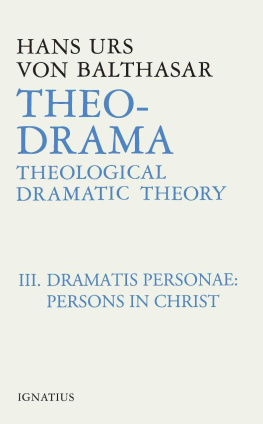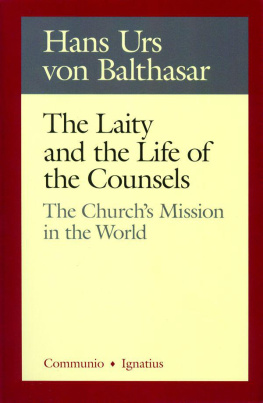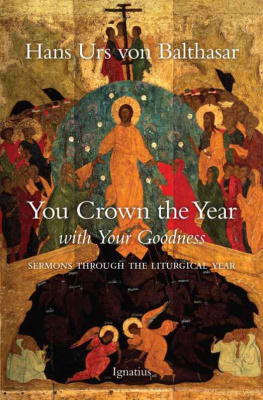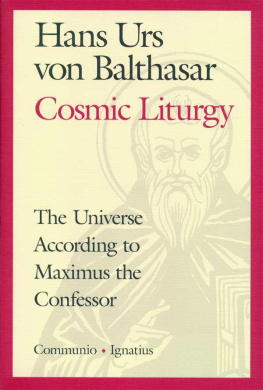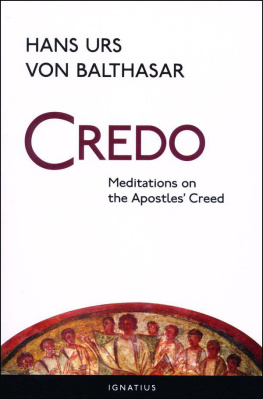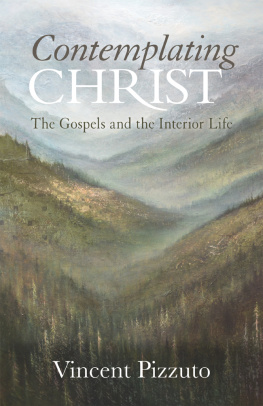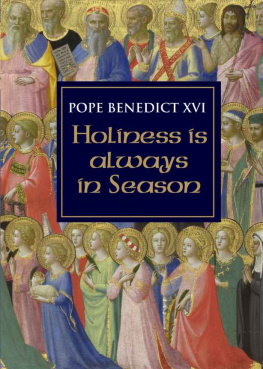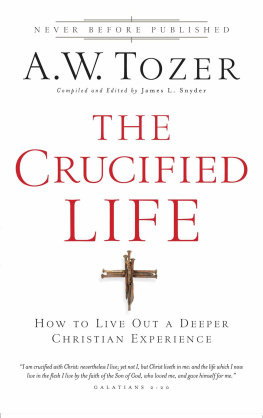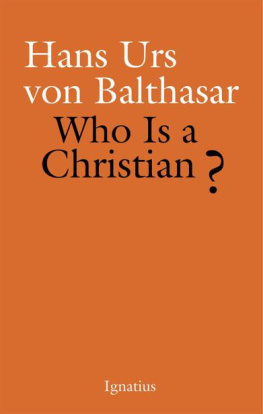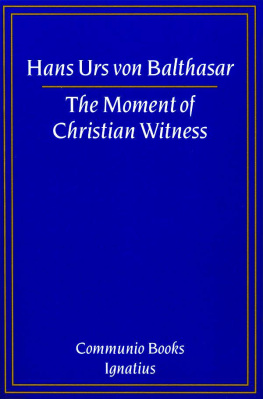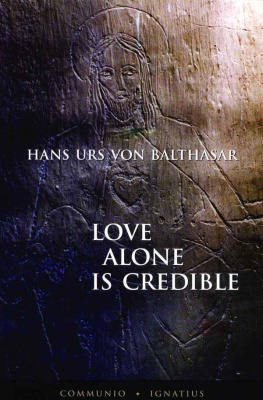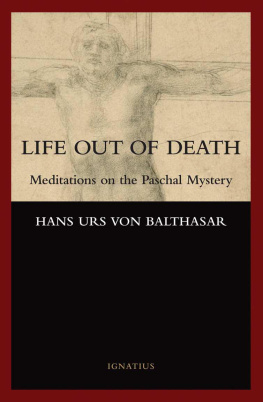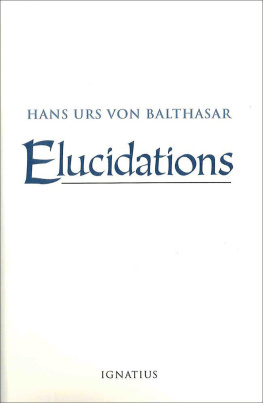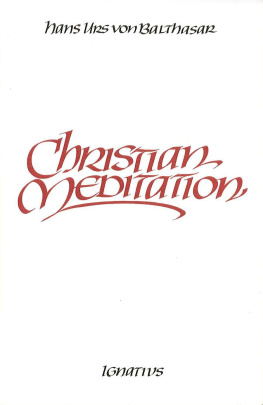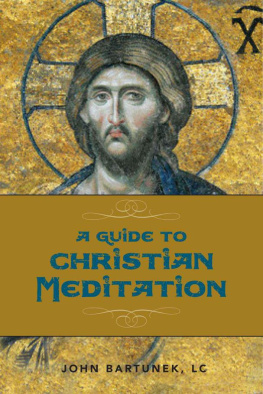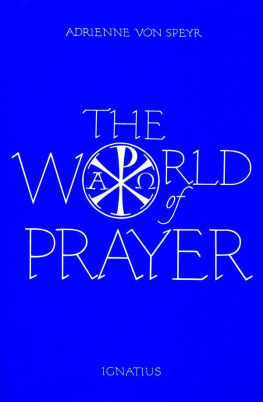THE CHRISTIAN STATE OF LIFE
HANS URS VON BALTHASAR
THE CHRISTIAN STATE
OF LIFE
TRANSLATED BY
Sister Mary Frances McCarthy
IGNATIUS PRESS SAN FRANCISCO
Title of German original:
Christlicher Stand
1977 Johannes Verlag, Einsiedeln
Cover by Victoria Hoke Lane
With ecclesiastical approval
1983 Ignatius Press, San Francisco
All rights reserved
ISBN 978-0-89870-7-885
Library of Congress catalogue number 82-84580
Printed in the United States of America
TABLE OF CONTENTS
PART I
BACKGROUND
1. The Great Commandment
2. Obligation and Choice
3. Love and Counsel (Thomas / Ignatius)
4. Love and the Vows
1. Creation and Service
2. Grace and Mission
3. Man in Paradise
4. Heaven
PART II
THE CHRISTIAN STATES OF LIFE
1. The Process of Division
2. The Founding of the State of Election
3. On the Relationship between the States of Life
4. Image and Truth
1. Christs State of Life
2. Marys State of Life
3. The Christians State of Life: In Christ
4. The Married State
1. The Priestly State
2. The Priestly State and the State of the Counsels
a. Way of Life and Ethos
b. The Two States of Election in the New Testament
c. On the Evolution of the Two States of Election
d. Scholasticism and the State of Perfection
e. More Recent Pronouncements
f. The Present State of the Question
3. The State of Lay Persons in the World
4. The States of Life and the Secular Orders
5. Evangelical State, Priestly State, Lay State
PART III
THE CALL
1. The Divine Call
2. The Stages of the Call
3. The Forms of the Call
4. The Elements of the Call
1. The Call Is Made Known
2. Recognition of the Call
3. Acceptance of the Call
4. Rejection of the Call
PREFACE ON THE SCOPE OF THIS BOOK
WHAT IS INTENDED
The sole purpose of this book is to provide a comprehensive meditation on the foundations and background of St. Ignatius contemplation on the Call of Christ, St. Ignatius adds that clearer signs are needed for entering upon the first than upon the second of these ways.
The goal of our meditation is to understand why this act of choosing a state or way of life within our Holy Mother, the hierarchical Church ( Sp Ex , 170) is possible and necessary in the first place, and why there should be any either-or since both ways are capable of leading us to the same perfection of love, just as the same act, viewed from different perspectives, can be either absolute or relative.
We begin, then, by affirming in its totality the significance conferred by the Spiritual Exercises on the practice of the principal act of the Christian lifea significance we recognize as emanating from the Gospel itself, from the personal meeting of the believer with Jesus Christ. Far from attempting to undermine this significance, we seek to understand it more fully, particularly within the structural and historical realities of the Church, for it is only within these realitieswhich, as they relate to calling, state and choice, have remained essentially unchanged since the Spiritual Exercises were composedthat the Christian is able to meet Christ concretely.
If this acceptance of the Churchs interpretation of the Gospel makes our meditation seem naive and vulnerable, it is well to remember that there is no aspect of this interpretation that has not been contested and the scientific refutation of which has not elicited long treatises which, in the end, have also failed to satisfy those who reject the Churchs viewpoint.
WHAT IS PRESUPPOSED
1. We presuppose, in the first place, that there exist within the Church, in which all Christians are called by God to take their stand We shall investigate the theological origin of this differentiation of states as it appears and is reconciled in the life of Jesus (and Mary) and shall attempt to locate it in the state of fallen nature in which the originally intended synthesis was shattered. This topic is discussed at greater length in Part II, where we speak of The Christian States of Life.
2. We presuppose also that to ensure the unity of his Church Jesus Christ, in calling the Twelve and challenging them to a radical following of himself, intended a primary election in which the personal elementthe decision to share his lifewas the definitive one and the element of ministerial calling (the call to the priestly as opposed to the lay state as the Church later distinguished them) was a secondary stage. This sentence contains a fundamental presupposition of our whole train of thought. In summary, it recognizes in those who are specially called to follow Christ (the word specially cannot be avoided here) a personal union of the state of evangelical perfection and the priestly state, but postulates within the Church itself a temporal, and even a qualitative, preeminence of the state of evangelical perfection over that of the ecclesiastical ministry. Christs primary intention was not to form a hierarchy, but to win men to that personal following of himself that leads to the reconciliation of the world with God by a renunciatory, even a crucified, love: with him, they are to be the light of the world.
Early theologians saw this fact clearly; continues to be valid in all that is essential.
There are two corollaries to this line of thought. 1) In addition to the total personal calling of those on whom Jesus, in his lifetime, expressly bestowed the full powers of ecclesial office, there was also established a permanent bond between official priesthood and personal sharing in the priesthood of Christ (in the state of evangelical perfection), however flexibly and variably the Church may have interpreted this bond throughout her history. 2) When the two ordines
3. We are not concerned, then, with exegetical theorizing about the origin of the three evangelical counsels. Unquestionably, theylike the seven sacramentswere counted at a later date and singled out as the constitutive elements of the life of evangelical perfectionwithout, of course, losing their meaning in relation to Christ as the approximation of his loving gift of himself to the Father and to men. Admittedly, too, the three counsels are rooted differently in the Gospel and in Paul. But that does not alter the fact that together they so completely exhaust the possibilities of what can be given that they are in no way subordinate to any of Jesus other counsels.
If the evangelists and the primitive Church extend their literal understanding of the counsels analogously and with full justification to one that is (purely) spiritual (cf. Sp Ex , 98), this does not prevent them from retaining the literal interpretation as well. The duae vitae [two ways of life], neither of which excludes the other, existed in the Church from the beginning, as did the priestly office, which throughout history has sought in often dramatic ways to define its relationship to the duae vitae . This point will be treated more fully in later pages.
Many will no doubt find it naive that, in accordance with tradition, we trace the distinctive character of the life of the evangelical counsels to Jesus, just as they will find naive our uncritical treatment of Holy Scripture, which we have frequently cited in support of our basic thesis. Be that as it may. We regard Holy Scripture as an inspired wholeone that is, moreover, interpreted in the essential tradition and history of the Church.
THE LIMITS TO WHAT IS INTENDED
1. We have not yet named the central theme of our study. The fruitful complementarity of states of life within the Church, which on the one hand refer each to the other (and therefore, depending on perspective, can each claim for itself the primacy), in relation to the world, the stand taken by Jesus is eccentric (i.e., having its center elsewhere) because it is, in a deeper sense, concentric in relation to God. The primitive ecclesiological echo of such a stand is the stand of Mary (as prototype of the Church), whose obedient-poor virginity earned for her the fecundity of motherhood.
Next page

